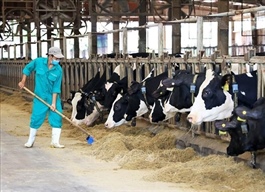All challenges to be addressed to assist struggling companies
All challenges to be addressed to assist struggling companies
The slow recovery of the business community has prompted the National Assembly to urge the government to take more drastic action to assist struggling enterprises.
The National Assembly’s Economic and Finance Committee (NAEFC) last week asked the government to apply more feasible measures to support the business community to as part of a plan to achieve strong economic growth.
“Based on the growth rate for Q1, in order to hit the whole year’s goal of 8 per cent or more, the average on-year growth rate in Q2, Q3, and Q4 must reach about 8.4 per cent. This is quite a big challenge given the global economic, political, and trade landscape remain in big risks and uncertainties,” the NAEFC stated.
The committee underlined that enterprises’ production and business activities are still bogged down in difficulties, with a high level of enterprises leaving the market.
The National Statistics Office last week announced that in the first five months of this year, the number of enterprises leaving the market hit nearly 74,560, up 19 per cent on-year; over 27,500 businesses suspended operations and awaited dissolution procedures, up 18.3 per cent on-year; and over 9,500 completed such procedures, up 15.6 per cent on-year. On average, about 23,000 enterprises were kicked out of the market each month.
Meanwhile, also in the first five months of this year, the number of newly established businesses stood at over 66,760, up only 0.6 per cent on-year.
The NAEFC underlined that the government must “continue to stabilise the macroeconomy, control inflation and exchange rate in order to advance timely response measures, and attempt to avoid shocks that badly affect macroeconomic stability, production, and business activities.”
The government has been asked to manage the monetary policy in a flexible manner suitable to the regional and international situation, and to develop a healthy and safe financial market with diversification of investment channels. Especially, the government must effectively carry out solutions to reduce costs for borrowing loans and access to loans of individuals and enterprises in activities involving production and business development, the committee said.
In addition, support measures must be given to enterprises, especially those heavily affected by the US tariff situation.
“It is imperative now that a boost be made in administrative procedure reform and decentralisation and empowerment closely linked with individual responsibility and strengthened examination and supervision,” stated NAEFC Chairman Phan Van Mai. “Close control must be made over the quality of newly enacted regulations to ensure that there is no rise in business conditions and compliance costs for businesses.”
The government last week promulgated a resolution on key solutions and tasks to materialise the country’s socioeconomic development and state budget estimates. It set a target that in 2035, 30 per cent must be cut from admin procedure length, business and compliance costs, and unnecessary business conditions. Procedures related to enterprises must be performed online to ensure smoothness, and effectiveness.
At present, it costs enterprises more than $4.8 billion to comply with nearly 6,400 administrative procedures, including nearly 4,400 procedures related to production and business activities, according to the Vietnam Chamber of Commerce and Industry.
NA deputy Nguyen Nhu So, representing the northern province of Bac Ninh, suggested that there must be an overhaul in administrative reform.
“It can begin by assigning ministries and agencies to implement quota in cutting procedures in each sector managed by them, with specific commitments and sanctions,” So said. “In fact, many enterprises have good capacity, products, and outlets for their products, they are still burdened by many overlapped procedures and contradictions among state management agencies. This has resulted in a rise in their costs, missed opportunities and eroded confidence.”
For example in the logistics industry, to establish a distribution centre combined with multimodal transport, businesses are obliged to obtain dozens of licences from different administration levels with different requirements, So said.
“It would take many enterprises a year to complete such procedures, while foreign rivals have jumped on the bandwagon to control the market share,” added So.
NA deputy Nguyen Lam Thanh, representing the northern province of Thai Nguyen, also suggested that in addition to further simplifying procedures, it is necessary to create a more transparent business climate with legal loopholes curbed. For example, Article 33 of the 2013 Constitution stipulates that everyone has the right to trade in the sectors not prohibited by the law.
“One can establish enterprises in an unlimited number without being carefully controlled,” Thanh said. “Many of them have taken advantage of the law’s loopholes to benefit from VAT worth trillions of VND (millions of US dollars) through using illegal invoices or bogus businesses.”
- 09:46 11/06/2025























